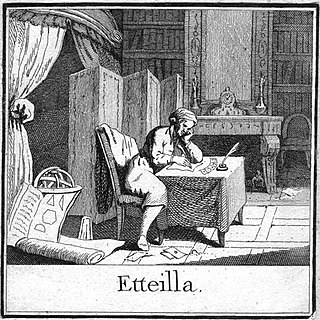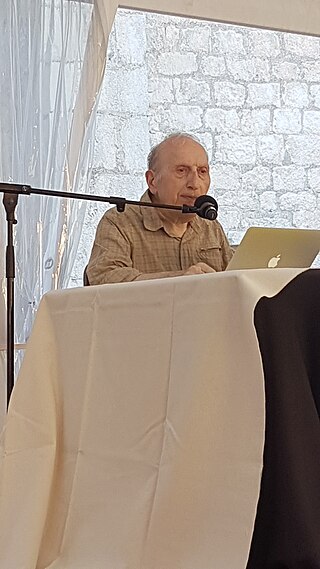
Christine de Pizan or Pisan, born Cristina da Pizzano, was an Italian-born French poet and court writer for King Charles VI of France and several French dukes.

Feudalism, also known as the feudal system, was the combination of the legal, economic, military, cultural and political customs that flourished in medieval Europe between the 9th and 15th centuries. Broadly defined, it was a way of structuring society around relationships that were derived from the holding of land in exchange for service or labour. Although it is derived from the Latin word feodum or feudum (fief), which was used during the Medieval period, the term feudalism and the system which it describes were not conceived of as a formal political system by the people who lived during the Middle Ages. The classic definition, by François Louis Ganshof (1944), describes a set of reciprocal legal and military obligations which existed among the warrior nobility and revolved around the three key concepts of lords, vassals, and fiefs.

The following is the timeline of lesbian, gay, bisexual, and transgender (LGBT) history.

Under the French Ancien Régime, a parlement was a provincial appellate court of the Kingdom of France. In 1789, France had 13 parlements, the oldest and most important of which was the Parlement of Paris. While both the modern French term parlement and the English word parliament derive from this French term, the Ancien Régime parlements were not legislative bodies and the modern and ancient terminology are not interchangeable.

"Etteilla", the pseudonym of Jean-Baptiste Alliette, was the French occultist and tarot-researcher, who was the first to develop an interpretation concept for the tarot cards and made a significant contribution to the esoteric development of the tarot cards to a wide audience, and therefore the first professional tarot occultist known to history who made his living by card divination. Etteilla also influenced the French divination professional Marie Anne Lenormand. In the years 1783–1785 Etteilla published his work Manière de se récréer avec le jeu de cartes nommées tarots, which is still considered the standard reference work of Tarot cartomancy. Etteilla published his ideas of the correspondences between the tarot, astrology, and the four classical elements and four humors, and in 1789 he published his own tarot deck, which, however, differed significantly from the classic tarots such as the Tarot de Marseille in terms of structure and card designations.

LGBT history dates back to the first recorded instances of same-sex love and sexuality of ancient civilizations, involving the history of lesbian, gay, bisexual, and transgender (LGBT) peoples and cultures around the world. What survives after many centuries of persecution—resulting in shame, suppression, and secrecy—has only in more recent decades been pursued and interwoven into more mainstream historical narratives.

The Assizes of Jerusalem are a collection of numerous medieval legal treatises written in Old French containing the law of the crusader Kingdom of Jerusalem and Kingdom of Cyprus. They were compiled in the thirteenth century, and are the largest collection of surviving medieval laws.
Michel Chion is a French film theorist and composer of experimental music.

Baroness Suzanne Lilar was a Flemish Belgian essayist, novelist, and playwright writing in French. She was the wife of the Belgian Minister of Justice Albert Lilar and mother of the writer Françoise Mallet-Joris and the art historian Marie Fredericq-Lilar.
Louis of Savoy, Count of Geneva from 1460, became King of Cyprus in 1459 upon his second marriage to Charlotte of Cyprus, reigning together with and in the right of his wife until 1464. He was the second son and namesake of Louis, Duke of Savoy and his wife, Anne of Lusignan, daughter of King Janus of Cyprus.

Pierre-Jean Grosley was a French man of letters, local historian, travel writer and observer of social mores in the Age of Enlightenment and a contributor to the Encyclopédie ou Dictionnaire raisonné des sciences, des arts et des métiers.

Jean-Claude Milner is a linguist, philosopher and essayist. His specialist fields of endeavour are linguistics and psychoanalysis. In 1971, Milner was at the Massachusetts Institute of Technology where he translated Noam Chomsky's Aspects of the Theory of Syntax into French. His work helped to establish the terminology of theory of syntax in the French school of generative grammar. Milner is now a professor at the University Paris Diderot and lives in Paris.

Émile Moselly was a French novelist.
The Association Arcadie, or simply Arcadie, was a French homophile organization established in the early 1950s by André Baudry, an ex-seminarian and philosophy professor. From its creation in the mid-1950s through the mid-1970s, Arcadie played a dominant role in the lives of French homosexuals as both a political and a social organization.
In medieval Europe, attitudes toward homosexuality varied from region to region, determined by religious culture; the Catholic Church, which dominated the religious landscape, considered, and still considers, sodomy as a mortal sin and a "crime against nature". By the 11th century Sodomy was increasingly viewed as a serious moral crime and punishable by mutilation or death. Medieval records reflect this growing concern. The emergence of heretical groups, such as the Cathars and Waldensians, witnesses a rise in allegations of unnatural sexual conduct against such heretics as part of the war against heresy in Christendom. Accusations of Sodomy and unnatural acts were levelled against the Order of the Knights Templar in 1307 as part of Philip IV of France's attempt to suppress the order. These allegations have been dismissed by some scholars.
The Master of Robert Gaguin was an anonymous painter, active in Paris around 1485–1500. He was so named by Nicole Reynaud after a manuscript of Robert Gaguin's translation of Julius Caesar's De Bello Gallico, offered by the translator to Charles VIII, king of France. He belongs to a circle of French artists, whose art follows the style of the Master François.
The Tuchin revolt was a tax revolt of "workers and artisans" in Southern France between 1378 and 1384.

Paul-Alexis Mellet is a French early modern historian and expert in the political and religious ideas from early modernity. He is a professor at the University of Geneva and a member of the Institute of Reformation History. Formerly, he was a professor at the University of Cergy-Pontoise, and at the University of Tours.
Jean-François Marie Joseph Louis Lemarignier was a French medieval historian.

The fundamental laws of the Kingdom of France were a set of unwritten principles which dealt with determining the question of royal succession, and placed limits on the otherwise absolute power of the king from the Middle Ages until the French Revolution in 1789. They were based on customary usage and religious beliefs about the roles of God, monarch, and subjects.